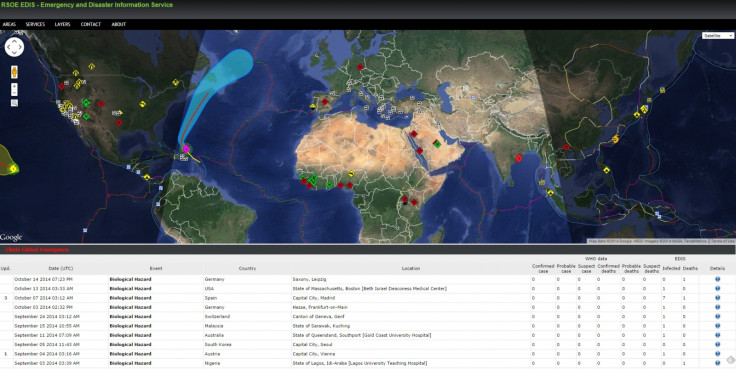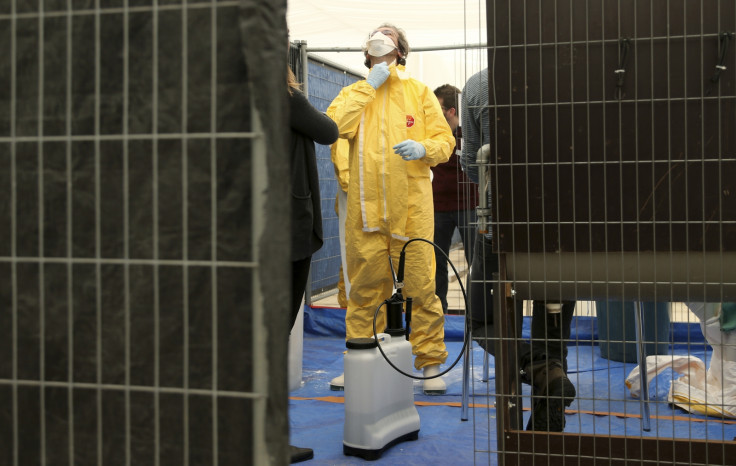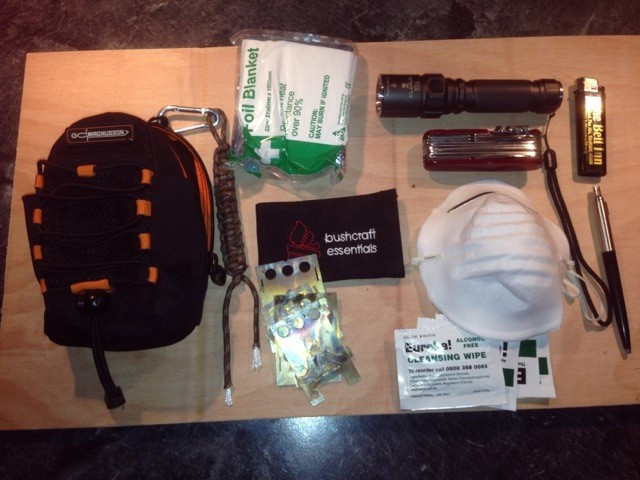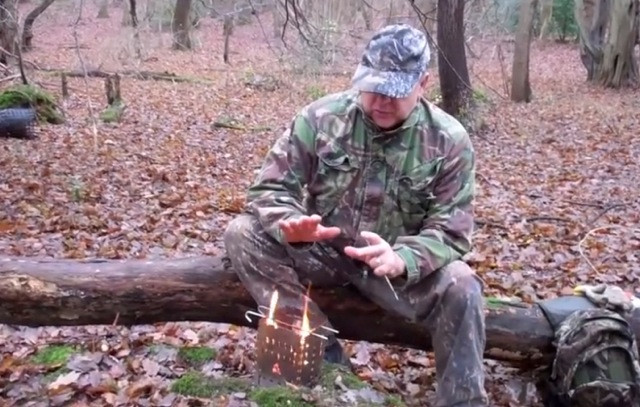Britain's Preppers: Amid Ebola, Islamic State and Ukraine-Russia Crises These Survivalists Are Ready for Black Swan Events

The walls of society are falling down. After months of geopolitical crises tearing through every region, the global economy has seized up and there are supply shortages of everything: food, water, energy. News comes through that riots are breaking out across the UK. What would you do?
John Bland knows exactly what he would do because he is a "prepper". Preppers are, as the nickname suggests, prepared. To them the collapse of society is not probable, but it is still possible. So they prepare for it in all ways, from boning up on survival skills to having fully stocked bunkers.
Bland, 32, has seven bags packed with essentials and ready to go at a moment's notice. He has bushcraft skills, a step-by-step plan, an escape route with supplies buried along the way, and three different target locations should he need to evacuate his family – a wife and five daughters aged nine to 17 – to a safe location. And if the crisis is viral, like Ebola, he has biohazard suits too.
"If something was to happen, every piece of equipment I would need to take with me will stay downstairs in close proximity to either the front door or the back door so we could escape as soon as possible," Bland, who lives in Lancashire, tells IBTimes UK.
There are plenty of things to fret about at the moment. The Ukraine crisis has flared old Cold War tensions between the West and Russia, with fears heightened by the timing: it is a hundred years since the outbreak of the First World War, a catastrophic global conflict few foresaw.
Religious extremists are marauding through the Middle East under the Islamic State banner, seizing control of parts of Iraq and Syria. The Ebola virus slowly spreading across the world is claiming thousands of lives.
And the markets are starting to wobble again, suggesting we may not have seen the end, or even worst of, the financial crisis. To cap it all off, nobody can predict where and when natural disasters will strike.
It was 7/7, the terror attack on London's transport network that killed 52 people, which triggered Bland into prepping. A trip to New York six months after 9/11, with the tragedy still raw both physically and emotionally, also had a profound effect on his thinking.
"It got me thinking then that we are very vulnerable to anything, whether it be a disaster, mother nature, anything like that," says Bland, who is a full-time carer for his wife and must factor her needs into his plans.
"And when it came really close to my home, so to speak, in London, where I used to live, it really opened my eyes to the possibility that it doesn't matter where you are in the world, it can happen to you."
...it doesn't matter where you are in the world, it can happen to you...
He is not alone. There are thousands of preppers across the UK, alert to every potential catastrophe, global or local, big or small. They gather in online forums to share tips and advice. Sometimes they meet up to learn new skills as well as to socialise.
"It just struck a nerve with me that I need to be a little more prepared than I am at the moment," says Steve Hart, 58, a site manager from Essex who has been a prepper all his life but has been taking it more seriously in the past five years.
"Rather than phoning up Dominos for a pizza, I should learn how to cook with the minimum amount of equipment and ingredients. Learn bushcraft and survival skills. Stock up on essential items that are going to give me half a chance should there be something that is going to cause most of the nation to go into major panic and meltdown.
"Which is what normally happens. You know, if we're a bowl of sugar short then there's a major panic, isn't there?"
Bug Out
Preppers think in threes. Three ways to filter water. Three ways to escape. Three ways to keep warm. So if one method fails, they have got two fall-back options: even their preparations have preparations.
They have so-called "Bug Out" locations, secret and fully-stocked hideaways or bunkers or safe houses to run to when anarchy reigns.
Many use forums to report major breaking news events to each other so they can keep an eye on emerging risks. Some use realtime activity maps to monitor what's going on where. One popular service is the Hungarians' Emergency and Disaster Information Service (EDIS).

"If your particular concern is a natural disaster then you can monitor it just as well as any scientist nowadays because you've got that information available to you," says Hart.
As risks ebb and flow, preppers change their plans to suit whatever happens to be the likeliest disaster.
And they can get anything they need online. Gas masks, Geiger counters, emergency ration packs, medikits, fire starter kits. Tools and knives with hollow handles so you can store things like fishing hooks, tablets, pins and other small bits.
It's not like the old days. Your grandmother could make a peanut last for two weeks for a family of four.
There are even wind resistant lighters, the kind of forgettable but essential detail that would leave the rest of us amateur campers flicking furiously in the forest as a breeze snuffed out the flame. The web is a survivalists' toy shop.
Hart has three Bug Out locations. One north of London, one in Norfolk and one in Kent.
"Unfortunately in this country we've got 65 million people crammed into a tin can, more or less. There's not a huge amount of places to go," he says.
But, should the worst happen, he is fully prepared to go. He's got the skills, the tools and the supplies to survive on his own. Even on an average day he carries around handy items, such as a pen that can break glass, for any unexpected events. Unlike most people.
"If the average person were to pack a rucksack and go and survive in the wilderness, shall we say, in all honesty they'd be highly unlikely to last very long," he says.
"It's not like the old days. Your grandmother could make a peanut last for two weeks for a family of four. Whereas now, everyone's got to go on the internet to get their meals delivered. If they can't put it in the microwave then that's it. They're stuck."
Ebola, Isis and Ukraine
It has been a busy year for doomsday watchers. Russia's military intervention in Ukraine has intensified concerns of another global conflict and one which would truly be the "war to end all wars" because it would probably mean thermonuclear annihilation.
At the very least it poses a threat to Europe's economic and energy stability, given the close trade between it and Russia. In particular, Russia supplies the lion's share of Europe's gas. It could potentially turn off the taps if the sanctions war between the West and Russia escalates further.
Extremist Muslims are rampaging through Syria and northern Iraq in their attempt to establish a new Caliphate, which they call the Islamic State. There seems to be little political will to stop them among Arab and Western countries with the military capacity.
But the Islamic State threatens the oil supply and the general stability of the Middle East, already suffering severe turbulence after the Arab Spring. And there are concerns that Islamic State sleeper cells are preparing to attack targets in the West.
Moreover, the Ebola virus is spreading through impoverished Africa, extinguishing thousands of lives. It is now in Europe and the US, though it has been contained so far. Ebola is not currently airborne, but scientists are worrying that it could mutate so it is: a nightmare scenario. Screening for Ebola is underway at Heathrow Airport.
"It's almost a slightly selfish attitude, insomuch as no-one's going to help me. Because the government, the police force, the services will collapse themselves," Hart says.
"Let's take the Ebola outbreak for example. If it were to take hold you're going to get people in the essential services getting the virus themselves.

"What about somebody who's in charge of power stations, or water purifying plants, or things like that? If the trained staff can't get in then the whole system is compromised.
"And then it's going to have a knock-on effect. You might start to get contaminated water through your pipes. No electricity. And it's a big snowballing effect then."
Hart says one of the most common concerns he finds among preppers in Britain is not necessarily a natural disaster, or the spread of disease. It's economic.
"As a general rule, because in the UK we're an island so we're relatively isolated from a lot of things, but again information plays a big part in this, people can see what's going on globally. There's always been your terrorist type of threat, the nuclear threat, the biochemical threat – there's always these sorts of things looming in the background," he says.
"But I would say, interestingly enough, from what I know regarding the prepping scene in the UK, it's more financial collapse. One of the number one things people consider is something that would bring the world to its knees."
This is prescient in the years following the financial crisis, when government intervention to bail out the enormous and failing banks prevented the collapse of the entire system, a terrifying and very real prospect at the height of the market chaos in 2008.
We are not in the clear yet. The eurozone economy looks like it is on the wane again, struggling to drag its head out of the financial mire. If it falls into crisis again, and drags other world economies down with it, it could spell mass social unrest. Even more so than we saw in Greece and Spain as the government austerity programmes got underway.
Overarching all of this is the Black Swan theory developed by Wall Street trader-turned philosophy academic Nassim Nicholas Taleb. It revolves around Black Swan events, which are defined as significant and unforeseen occurrences that come as a surprise, but, in hindsight, could have been spotted if the warning signs were heeded. Only preppers are ready for Black Swan events.

Huge underground following
In just eight weeks, the UK Preparedness Network, an online community of preppers administered by Bland, has seen its membership increase more than threefold to over 600.
"It's a massive leap. And a lot of them are starting to be frightened of mostly the Ebola virus. They want information on how to protect their families," Bland says.
"I would say [interest] has drastically increased. Which is good because it will benefit everybody as a community as well.
"I feel, as well as our group, everyone needs to learn something about preparedness. So that if something does happen, whether it be Ebola or the Russia-Ukraine crisis gets worse, then we can come together and get through it."
Hart, who runs the UK Preppers Guide website, says there's a "huge underground following in prepping now".
"My site has recently been getting around 10-12,000 pageviews a day. Which for something that's a relatively obscure topic is quite a lot of hits," he says.
"I've definitely seen a rise since I started the site two and a half, three years ago. I've seen a huge rise. And even more so I'd say in the last six months, certainly in the last couple of weeks with the Ebola outbreak.
"I've got pages on there I wrote nine months ago regarding epidemics and that page is getting hit and hit literally thousands of times at the moment."
Hate mail
There is something of a lockdown mentality in parts of the online prepper community. Some of the forums are closed to the public and have a strict vetting procedure for new members. It is perhaps understandable for a group often maligned or mocked in the media, characterised as armed boy scouts or paranoid conspiracy nuts.
One recent documentary on national television cast preppers in this light. And Bland, who has "only just come out of the closet" about being a prepper, says members of the community have suffered because of it.

"They've received a lot of hate mail. A lot of people knocking on their doors, threatening to kill their children. Threatening to rape their wives," he says, because some saw them as gun-loving oddballs who are a threat to society.
"We're not. We all live a normal life. We've all got 9-5 jobs. We go out and have fun with our friends. We go out and do everything that normal people do," he says.
"A lot of people see us as a danger to society, which is wrong and it's taken a lot of time and effort to try and change people's minds. For preppers, you have to be very, very careful who you speak to and who you tell.
"Because I've got kids, I have to be very careful with what I do. There's a lot of hate for being a prepper."
Lunatic survivalists do exist, of course. But these people are right at the fringe, the sort of fruitcakes who attach themselves to every movement. At the heart of the preppers community are ordinary, decent people who simply believe in that old adage: failing to prepare is preparing to fail.
This is a message they try to apply to everyday life to show how, in their own ways, everyone is a prepper. After all, we buy insurance, we save money, we have torches for when the lights suddenly go out. Isn't that prepping?
Bland points to events such as the recent flash flooding in parts of the UK, which left many people stranded and without power in their homes for days. A prepper would be stocked to the rafters with what they need to get through such a miserable situation. It is not just the apocalypse preppers are ready for, but almost anything life throws at them.
"A lot groups now have closed down or gone secret because of the risk of people finding out. Which is sad really because as preppers we want to spread the information," Bland says.
"We want to get out there and tell the community by doing this you can help your family and kids through any disaster. Even job losses. If you've lost your job and you've got a three month supply of food, at least you can feed your children."
He hopes to turn his prepper community into a charity and offer survivalist training courses, from first aid to bushcraft, to members of the public. He could make a living selling this knowledge, but for Bland prepping skills are a public right. So the group's courses and information will be free.
Self-sufficient
Perhaps civilisation will not collapse. But perhaps it might. And preppers have decided that the pragmatic response is to be ready for any eventuality.
If we are honest, they are the ones who will be laughing. And laughing hard inside their impenetrable Bug Out hideaways, chomping on corned beef and baked beans as the rest of us brawl with makeshift spears and saucepan clubs for the last rotting rat carcass.
"We see the world very differently to non-preppers," says Bland.

"For non-preppers, they always feel safe that the government and public services will come to their rescue. Even though we would like them to, we would rather be self-sufficient so that the people that need to be rescued can be."
Hart says it was not that far back in history that many people had all the survival knowledge he has today. If the entire electricity grid were to be knocked out, Hart says, perhaps by a major solar flare spat at us by the sun, it would set us back a couple of hundred years.
"But the problem now is people don't know how to live like beforehand, when you could make a fire and cook over that fire and even maintain the fire so it doesn't go out. All these skill shave been lost," he says.
"Then again, is it ever going to happen? Probably not. But there's this tiny what-if per cent that it would happen.
"If you need to start prepping when a disaster happens, you've failed. It's too late. You might as well give up."
They say only cockroaches would survive a nuclear apocalypse. But that is not true. The preppers would too. And they would be chowing down on radioactive cockroaches.
© Copyright IBTimes 2025. All rights reserved.




















